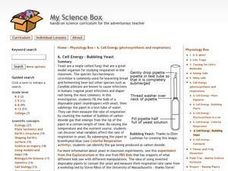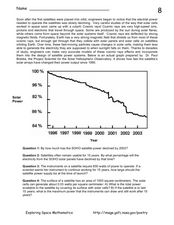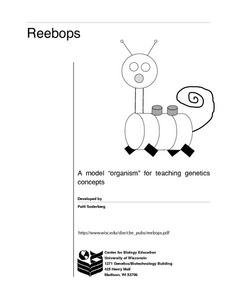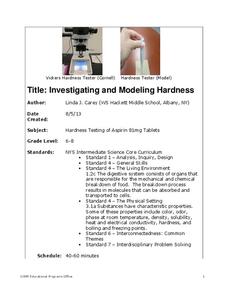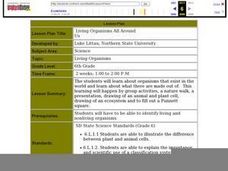Curated OER
Cell Energy - Bubbling Yeast
Students identify that yeast are a single celled fungi that are a great model organism for studying respiration in the classroom. They also fill the bulb of a disposable pipet (eyedropper) with yeast, then submerge the pipet in a test...
Curated OER
Review of Cell Organelles
In this cell organelles worksheet, students read the structure and function of different plant and animal cell organelles to determine what organelle is being described. Students write in the 15 organelles into a chart.
Curated OER
Memorable Cell Membrane
Students investigate the components of a cell membrane. In this cell membrane lesson plan, students build a cell membrane model using toothpicks and candy to represent the parts of the membrane including the phospholipid bilayer and the...
Alabama Learning Exchange
Edible Cell
Students identify cell parts and their function. In this animal cell lesson plan, students view a video clip and discuss cell components. Students create an edible replica of an animal cell using food items.
Curated OER
Travel Brochure for a Cell
Students create a brochure to entice readers to 'visit' their cell organelles and functions 'amusement park'. Students use humor and 'roadside attractions' for an inspiration - 'visit the ribosomes to watch proteins synthesized before...
Curated OER
Cell City Analogy
In this cell analogy learning exercise, students are given a story about a city that produced widgets. They compare this to a cell and identify the parts of the cell that are analogous to the parts of the city. They then create their own...
Curated OER
Cosmic Rays and Solar Cells
In this cosmic rays and solar cells worksheet, students read about how cosmic rays damage the electrical output of solar cells over time on satellites. Students use a graph of the solar power output compared to the year for the SOHO...
Curated OER
The Building Blocks of Life: Cell Building
Students view a short video from www.unitedstreaming.com. They then construct parts of a cell by building a model of an animal and plant cell using regular household materials.
Curated OER
Reebops a Model "Organism" for Teaching Genetics Concepts
Reebops are cute, marshmallow-based creatures that can be used to teach inheritance. Beginning biologists draw strips of paper that represent chromosomes from two envelopes, one for the father, and one for the mother. Each parent...
Curated OER
Cell Division: Frog Egg Division Observation and Modeling
Learners create and test a hypothesis about cell division. After observation of Frog Egg cell division, students write obervations and refine process and hypothesis. The use of scientific method, group work and inquiry are fostered by...
Curated OER
Solar Cell Simulation
Students study photovoltaic technology. In this photovoltaic technology lesson, students simulate a photovoltaic system. Students discuss how to simulate a cloudy day.
Cornell University
Investigating and Modeling Hardness
Model hardness testing with a self-designed hardness test. Young scholars rate the hardness of different types of aspirin using the Vicker's Hardness scale. They then relate hardness to the solubility of each aspirin tablet.
Curated OER
Modeling Limits To Cell Size
Learners participate in a 'hands-on' activity that simulates the changing relationship of Surface Areas -to- Volume for a growing cell. They assemble models of cells for comparison.
Baylor College
What Is a Neuron?
Your class won't get on your nerves while doing this modeling activity! After teaching the structure and function of a neuron using the included diagrams, give individuals some clay and chenille stems so that they can make their own...
Curated OER
Series or Parallel?
Emerging electricians extend mental models of light bulbs and resistors in series and or in parallel circuits to include the connection of photovoltaic cells in arrays. They investigate open circuits, using a DC voltmeter, a light...
Curated OER
DNA, the Awesome Thread of Life
Learners examine how traits are passed to offspring. In this genetic reproduction lesson students develop a model of dna and learn about its structure, replication and function.
Biology Junction
Cellular Structure
The human body contains more than 200 types of cells, and plants contain many other unique types of cells. While a huge variety of cells exist, they appear to have very similar structures. A detailed presentation describes the structure...
Curated OER
Photocells II: The Photoelectric Effect in Photocells
It's not easy to find fabulous physics lesson plans, but School Power Naturally has put together a series of them. In this particular lesson, high schoolers learn about the structure and functioning of photovoltaic cells. They construct...
Curated OER
Living Organisms All Around Us
Sixth graders study organisms that exist in the world and what they are made up of. They participate in a nature walk, a presentation, a drawing of an animal and plant cell, draw a ecosystem, and fill out a Punnett square.
Concord Consortium
Modeling Translation
An mRNA sequences make proteins, the most common molecules in cells. Young scientists observe translation of mRNA on ribosomes. They view them forming amino acids. Finally, the amino acids curl into proteins.
Curated OER
Cell 3: Organelles B
Students, after researching cells, construct a model cell. They explain the structure and function of eukaryotic organelles in a presentation. In addition, they create their own analogies to describe the structure and function of...
Curated OER
Genetics and Heredity: The Next Generation
Tenth graders work in teams to order events of DNA transcription and translation protein synthesis. In the second lesson, they put the steps of mitosis and meiosis in order using a concept map poster. They use modeling clay to create...
Columbus City Schools
You Can’t Sneeze On This Tissue
Take your class' understanding of cells to the next level... or levels! Demonstrate the levels of organization using a variety of engaging methods. The teacher's guide includes the materials you'll need to execute a flower...
Curated OER
Cells
In this scientific investigation activity, students follow the provided procedures to examine the number of cells in animals and then respond to 3 short answer questions.
